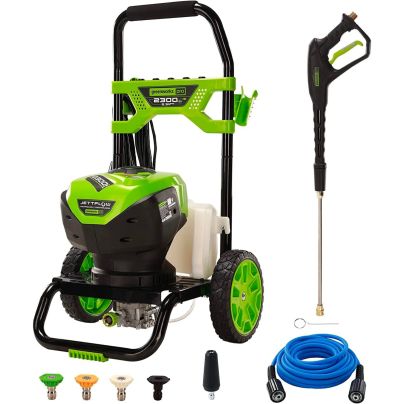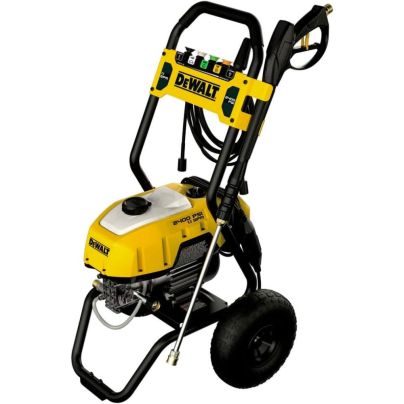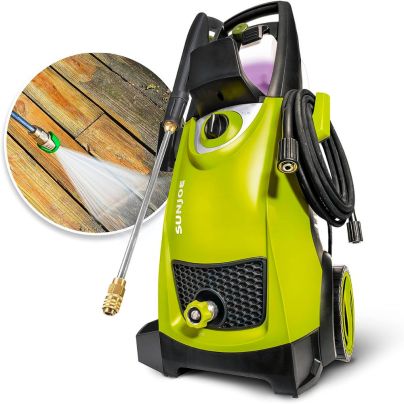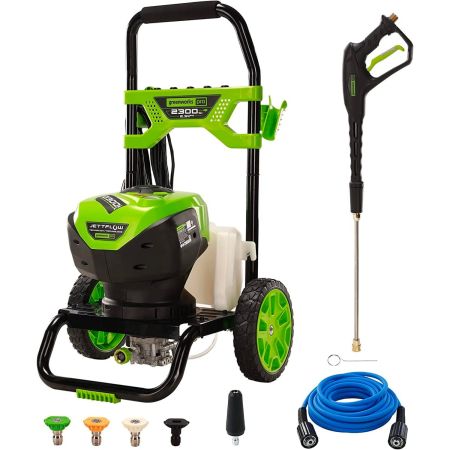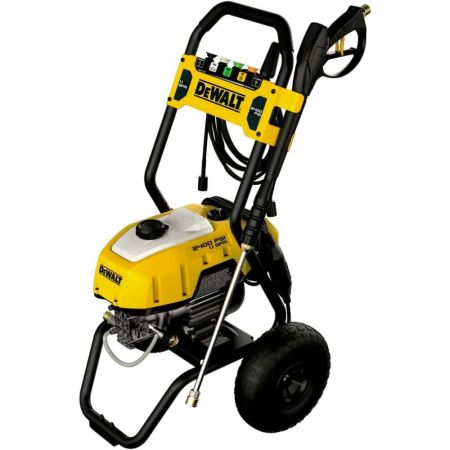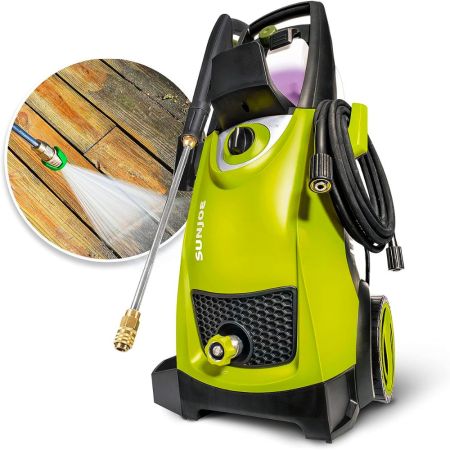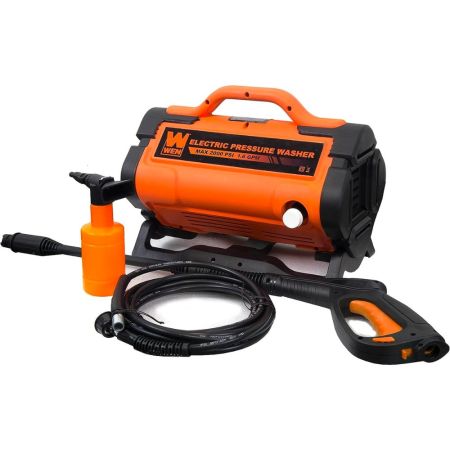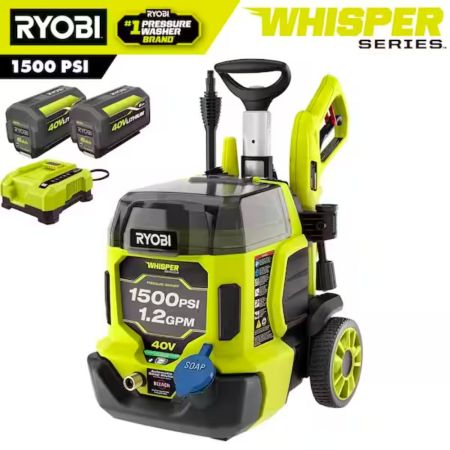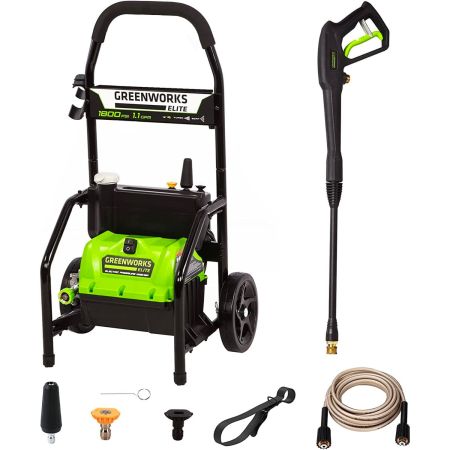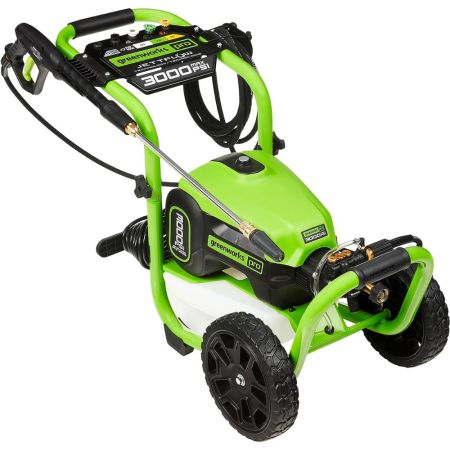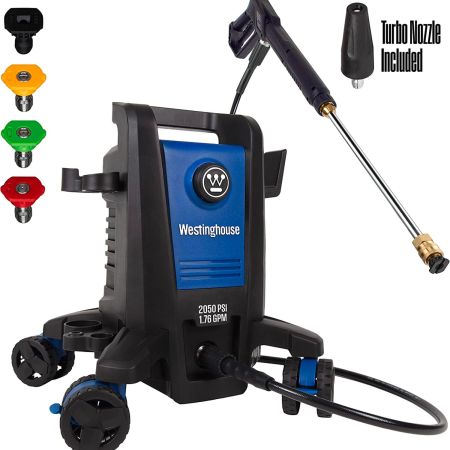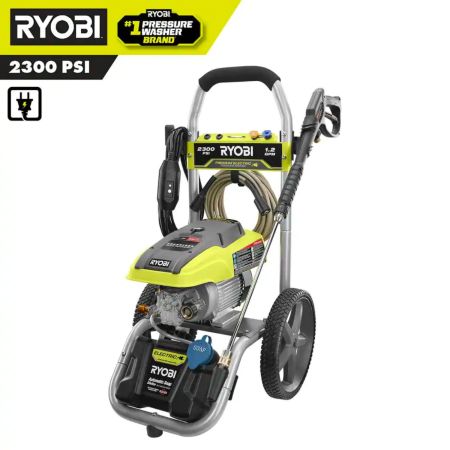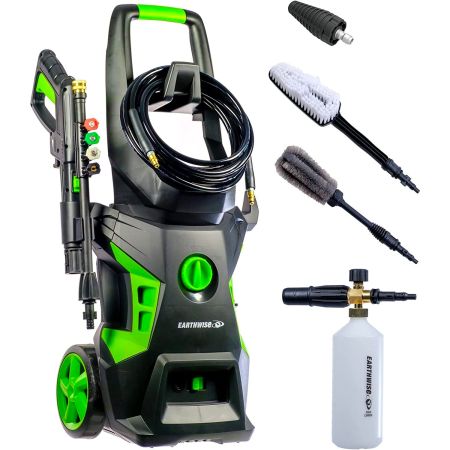We may earn revenue from the products available on this page and participate in affiliate programs. Learn More ›
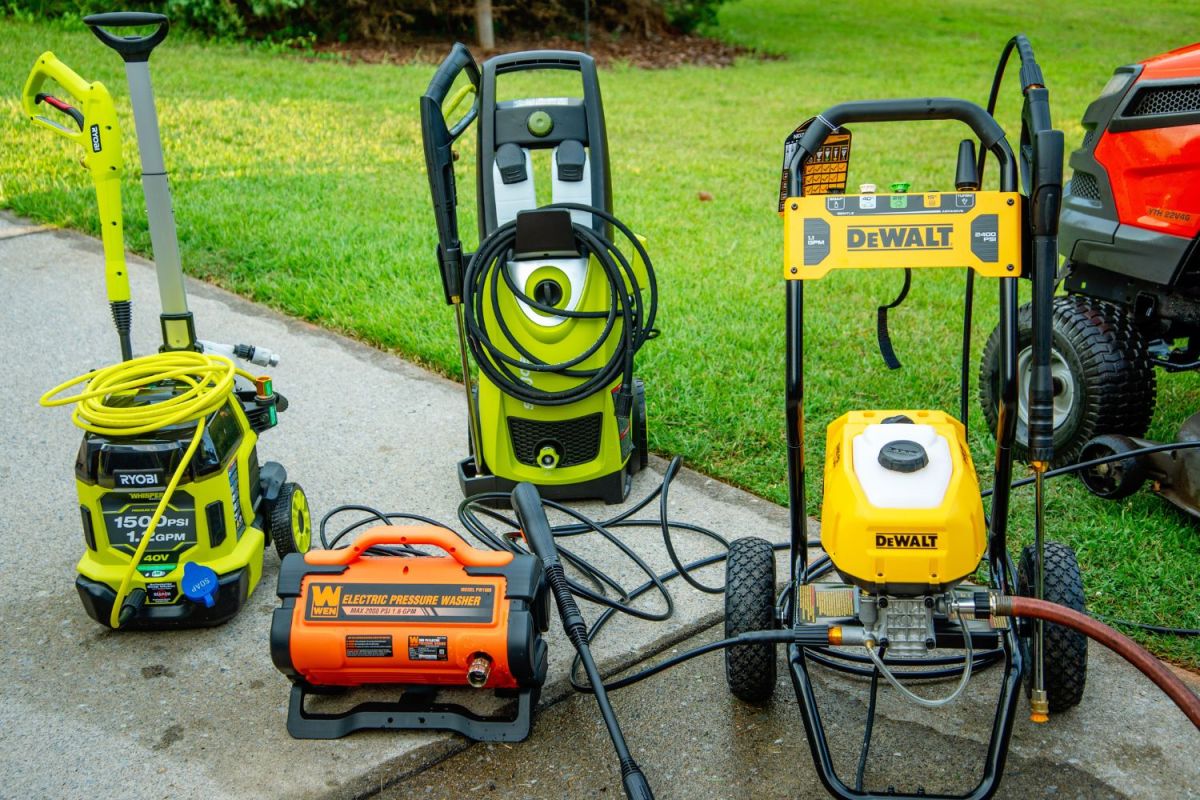
An electric pressure washer is an excellent piece of equipment because it produces dramatic cleaning results. It can quickly and safely wash a muddy vehicle or strip grime and goo from patio furniture, decks, or the siding on a house. Cleanup jobs that take a lot of time and elbow grease with a scrub brush and a garden hose are achievable within minutes using a pressure washer.
Pressure washers use pumps and engines to amplify water pressure, turning your garden hose into a high-powered cleaning machine. There are two general types of pressure washers: electric-powered and gasoline-powered. While gas-powered pressure washers typically offer more power, electric pressure washers are growing in popularity for their combination of cleaning power, portability, and overall versatility. Plus, the best electric pressure washer models can tackle many of the same jobs as gasoline-powered washers used by professionals, and they are more affordable, lighter, quieter, and easier to store and maintain.
There are many electric pressure washers on the market with a wide range of features, so it can be tough to choose the best electric pressure washer for your cleaning projects. In order to figure out which models are right for different jobs, we chose some of the most popular models and tested them for cleaning power, portability, and versatility.
Keep reading to learn more about shopping considerations, and take a look at our detailed hands-on product reviews of some of the best electric pressure washers on the market.
- BEST OVERALL: Greenworks 2,300 PSI 2.3 GPM Electric Pressure Washer
- RUNNER-UP: DeWalt 2,400 PSI 1.1 GPM Electric Pressure Washer
- BEST BANG FOR THE BUCK: Sun Joe 2,030 PSI 1.76 GPM Electric Pressure Washer
- BEST PORTABLE: Wen PW1900 2,000 PSI 1.6 GPM Electric Pressure Washer
- BEST CORDLESS: Ryobi 40V 1,500 PSI 1.2 GPM Electric Pressure Washer
- BEST LIGHT-DUTY: Greenworks 1,800 PSI 1.1 GPM Electric Pressure Washer
- BEST HEAVY-DUTY: Greenworks Pro 60V 3,000 PSI 2.0 GPM Pressure Washer
- MOST VERSATILE: Westinghouse 2,050 PSI 1.76 GPM Pressure Washer
- BEST FOR DRIVEWAYS: Ryobi 2,300 PSI 1.2 GPM Electric Pressure Washer
- BEST FOR AUTO DETAILING: Earthwise 2,050 PSI 2.0 GPM Electric Pressure Washer
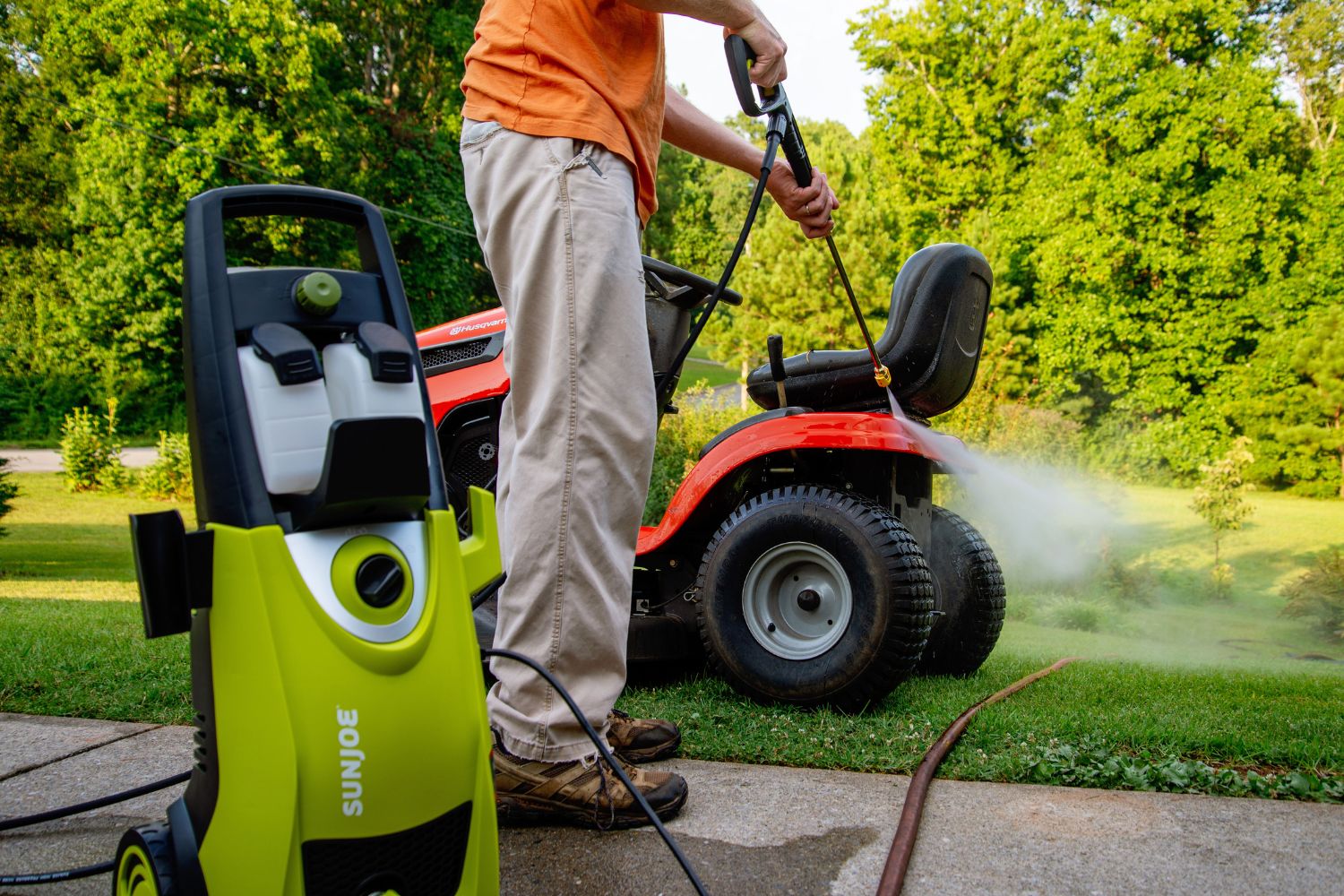
How We Tested the Best Electric Pressure Washers
Electric pressure washers can clean the same surfaces as larger gas-powered ones. Choosing an electric option means sacrificing a bit of pounds per square inch (psi) and gallons per minute (GPM), which translates to cleaning speed—but electric versions have upsides, too. They eliminate the need to purchase and store gasoline; do away with exhaust fumes; and cut the machine’s noise, size, and weight in about half. Electric pressure washers offer aggressive cleaning power without the hassle of gasoline. We used these considerations to develop our criteria for our hands-on tests.
In our tests, we evaluated cleaning power, range, and mobility along with ease of transport and storage. Our driveway test area included multiple surfaces for cleaning, such as a lawn mower, car tires, vinyl house siding, and the concrete driveway. Scoring favored practical strengths that affect the user’s experience, like hose length and flexibility, spray gun trigger stiffness and kickback, spray nozzle and accessory options, ease of mobility during cleaning, noise, and perceived durability.
Our Top Picks
Portability, size, power, cord length, and accessories are some of the top features that set some electrical pressure washers ahead of others. Check out the individual product reviews ahead to learn how each pressure washer performed in our hands-on driveway tests.
Those needing more cleaning power for more significant projects like siding, fences, and driveways may want to consider the Greenworks 2,300 psi electric pressure washer. The higher pressure and flow rates of 2,300 psi and 2.3 GPM help get the work done faster. A bulky frame and large 10-inch wheels allow easier access to projects located away from paved surfaces. The kit includes a turbo nozzle and four spray tips: soap and 15, 25, and 40 degrees. It also includes an onboard injection system for dispensing cleaning solutions.
We found the spray wand grip and trigger comfortable to work with. The 25-foot flexible hose was easy to maneuver while cleaning all sides and under the hood of a riding mower. Combined with its 35-foot power cord, this washer has lots of reach. Its biggest downside will mostly impact those short on storage room, as they might find this pressure washer a bit of a space hog.
Product Specs
- PSI: 2,300
- GPM: 2.3
- Hose length: 25 feet
Pros
- Large 10-inch wheels move well on all terrain types
- Upright configuration with tall transport handle and comfort grip make it easy to move
- Flexible 25-foot pressure hose maneuvers easily and provides a long reach
- Onboard soap tank and 5 nozzles for a variety of cleaning projects
Cons
- Bulky frame takes up more storage space
- There’s a bit of a lag between triggering and pressurizing that takes some getting used to
Get the Greenworks 2,300 psi electric pressure washer at Amazon or Greenworks.
Whether you’re washing the deck or detailing the car, a rugged mobile pressure washer makes the job simpler. The DeWalt 2,400 psi electric pressure washer comes equipped with the power and accessories necessary to make cleanup quick and easy. DeWalt’s 13-amp axial pump motor creates 2,400 psi of water pressure at a flow rate of 1.1 GPM. The onboard soap tank and five assorted quick-connect spray nozzles ensure no cleaning project is too demanding.
The upright frame and inflatable rubber tires on this DeWalt pressure washer made it easy for us to maneuver around the yard. All its hose connectors and other hardware components felt durable and assembled securely. The 25-foot pressure hose and 35-foot power cord offered a long reach for easy access to water, electrical outlets, and our cleaning projects. Its flow rate of 1.1 GPM was lower than most of the tools we tested, and while it was still effective for most projects, it didn’t clean as quickly as our top pick.
Product Specs
- PSI: 2,400
- GPM: 1.1
- Hose length: 25 feet
Pros
- Upright configuration and air-filled rubber tires make it easy to maneuver on uneven ground
- Built to last with sturdy hoses, connectors, and other hardware
- Includes a built-in soap tank and 5 assorted nozzles for tackling an array of cleaning projects
Cons
- 1.1 GPM flow rate conserves water but cleans more slowly than competitors with higher flow rates
- Spray gun does not fit securely in the tool rest, making it more cumbersome to transport
Get the DeWalt electric pressure washer at Amazon, Ace Hardware, The Home Depot, Walmart, or Acme Tools.
If you’re looking for a quality pressure washer on the cheap, look no further than the Sun Joe 2,030 psi 1.76 GPM electric pressure washer. Anyone willing to do a bit of assembly will be rewarded with a unit that boasts midrange cleaning power and better-than-average hardware.
Although assembly was necessary to get this unit up and running, the whole process only involved installing four parts with four screws and took less than 5 minutes. The housing and handle were plastic and felt a bit cheap, but everything lined up properly, and once assembled, it was sturdy. We had no other complaints—the pressure hose, spray gun, and connectors were of good quality, and the quick-connect spray nozzles worked comparably to the more expensive models.
In action, the Sun Joe electric pressure washer performed well on all our projects. Both the pressure and flow rate felt moderate. While performing the annual deep cleaning of a riding mower, it only left behind some of the hard-to-remove deeply embedded dirt and grass clippings around the discharge chute.
Product Specs
- PSI: 2,030
- GPM: 1.76
- Hose length: 20 feet
Pros
- Bargain price for a well-equipped pressure washer with good cleaning power
- Includes dual soap tanks and 5 assorted nozzles for a range of cleaning tasks
- Lightweight construction makes it easy to maneuver, transport, and store
- High-quality pressure hose and hardware
Cons
- Requires more assembly than the other tools on our list
- Plastic body, wheels, and handle feel less durable than the competition
Get the Sun Joe electric pressure washer at Amazon, The Home Depot, Walmart, or Bass Pro Shops.
This Wen pressure washer produces up to 2,000 psi with a water flow of 1.6 GPM, which is enough power to clean a deck or lawn equipment. It’s just under 14 inches tall and wide and weighs just 20 pounds—about the size and weight of a small cooler full of ice—so it’s easy to move around. The Wen washer has a 36-foot power cord and a 16.5-foot hose, so it can clean objects relatively far from an electrical outlet and water source. This model includes a detachable soap tank plus a built-in nozzle adjustment to change the angle and pressure of its spray.
At first glance, the Wen looks more like a portable tire inflator than a pressure washer. It is very lightweight and has no wheels or place to store the power cord or pressure hose when not in use. But it proves itself admirably in operation, with enough water pressure and flow to wash a car, clean patio furniture, or eliminate a driveway stain. Although very portable in the sense that it is small and lightweight, making it easy to load up in the car, this pressure washer lacks maneuverability while cleaning. It’s best, and surprisingly effective, for small tasks.
Product Specs
- PSI: 2,000
- GPM: 1.6
- Hose length: 16.5 feet
Pros
- Compact unit is easy to load in a car or store in smaller spaces
- At about 20 pounds, it is lightweight and easy to carry
- Plenty of power for basic chores like washing automobiles, lawn equipment, etc.
Cons
- Lacks onboard storage for the hose, wand, and power cord
- Needs a carrying case or a tote to store everything together
- Lacks wheels; needs to be carried from place to place
Get the Wen electric pressure washer at Amazon, Lowe’s, Walmart, or Wen.
Some cleaning jobs must happen without a convenient electrical outlet or water spigot nearby. With the Ryobi 40-volt cordless pressure washer, there is no need to resort to a scrub brush. It runs on rechargeable batteries and has the ability to siphon water from a bucket.
With up to 45 minutes of runtime per charge, this is a great option for small to midsize chores. In normal mode, it produces 1,000 psi at 1.2 GPH, and with the press of the boost button, it bumps up to 1,500 psi at 1.2 GPH. The motor and soap tank feature a compact cube-shaped design with a telescoping handle and rear wheels that stores easily and maneuvers well on hard surfaces.
The Ryobi 40-volt cordless pressure washer comes equipped with a soap nozzle, a 15-degree nozzle, and a turbo nozzle that rotates the pressurized stream to increase cleaning power. Two 40-volt 6-amp-hour batteries and a rapid 2-hour charger come with the kit.
In our tests, this cordless pressure washer impressed more with its versatility than its cleaning ability. For remote cleaning needs, it could be a handy helper. The compact build and ability to use water from either a spigot or a nonpressurized source make it a nice option for RVers, boaters, and others who may have to clean where electricity and running water are unavailable. On the other hand, its top cleaning power (in boost mode with the turbo nozzle attached) ranked at the bottom of all the models we tested. It worked well to remove dirt and debris from smooth surfaces, but it was not very effective for cleaning concrete.
Product Specs
- PSI: 1,500
- GPM: 1.2
- Hose length: 25 feet
Pros
- Two 40-volt 6-amp-hour batteries offer up to 45 minutes of runtime per charge
- No water spigot required; capable of siphoning water from a bucket
- Power-boost mode increases pressure by 500 psi
Cons
- Lowest total cleaning power of all the models we tested
- Only 20 minutes of runtime on power-boost mode
- More expensive than the top-performing plug-in electric models
Get the Ryobi 1,500 psi electric pressure washer at The Home Depot, Amazon, or Ryobi.
The Greenworks 1,800 psi electric pressure washer is a good choice for tackling lighter projects around the house. This machine produces up to 1,800 psi and has a water flow rate of 1.1 GPM, which is enough power for cleaning boats, patios, or siding. It comes with three quick-connect tips in varying angles, a soap nozzle, an onboard soap tank, a 35-foot power cord, and a 20-foot hose. The long hose and cord let you reach jobs far from an electrical outlet, and it has a rack that holds the nozzles—a nice feature that keeps them organized and close at hand.
We like that this light-duty pressure washer is built with large 8-inch wheels and a sturdy frame, which are conveniences not typically found on light-duty machines. The upright hand-truck-style frame made it easy to roll across the grass to wherever we needed it. The 20-foot pressure hose was good for cleaning all the crevices of a rototiller, but it was a bit stiff as we moved from side to side.
Product Specs
- PSI: 1,800
- GPM: 1.1
- Hose length: 20 feet
Pros
- Large 8-inch wheels roll easily over grass and uneven surfaces
- Comfortable grip and trigger operation is ideal for extended use
- Good reach with a 35-foot power cord and a 20-foot pressure hose
Cons
- Rigid hose was somewhat cumbersome to work with
Get the Greenworks 1,800 psi electric pressure washer at Amazon, Lowe’s, Walmart, or Greenworks.
Tough jobs like cleaning the driveway, deck, or patio call for a heavy-duty tool like the Greenworks Pro. It delivers 3,000 psi at 2.0 GPM for powerful cleaning action. Included in the kit are 15-, 25-, and 40-degree spray tips; a soap applicator tip; and a turbo nozzle. A 1-gallon detergent tank holds a full bottle of cleaning solution for direct injection into the spray stream, and the pressure hose is 25 feet long for ample range. Built on a tubular steel wheelbarrow-style frame, this unit has a low center of gravity and large 10-inch wheels for stability on uneven ground.
Outstanding cleaning capability combined with an excellent working range and a highly flexible hose made it a pleasure to work with. This pressure washer was the most capable when it came to washing concrete, cleaning nearly twice as fast as the next closest performer. Although some storage space can be saved by standing the unit vertically on the front of its frame, storage could remain a problem for those who are spatially challenged.
Product Specs
- PSI: 3,000
- GPM: 2.0
- Hose length: 25 feet
Pros
- Horizontal wheelbarrow-style build with a stable low center of gravity
- Pliable 25-foot pressure hose was easy to maneuver
- Good pressure and water volume for larger cleaning projects
Cons
- Bulky frame takes up more storage space
- Transport handle is only 23 inches high, which will likely be uncomfortable for taller users
- No lower spray gun support makes travel somewhat awkward
Get the Greenworks 3,000 psi electric pressure washer at Best Buy, Costco, or Greenworks.
The Westinghouse packs 2,050 psi and has a water flow rate of 1.76 GPM. It can handle cleanup jobs ranging from light tasks like cleaning cars to heavier tasks such as desliming sidewalks. The washer has four 3-inch casters that rotate 360 degrees, so it can turn on a dime and is easy to maneuver as you work. At just under 17 inches tall, it has a low center of gravity that makes it hard to tip over. The Westinghouse comes with four nozzles, a 25-foot hose, a soap applicator, and an onboard soap tank to pump up the cleaning power on your tasks.
Working with the Westinghouse feels somewhat like using a wet/dry vac, in a good way. A feature unique to this four-wheeled pressure washer is that if the casters are unlocked, it can follow the operator with just a slight tug. The pressure hose had a high degree of flexibility for excellent maneuverability. While it may not be the best choice for big projects out in the yard, it’s a great choice for most cleanup jobs taking place in the driveway.
Product Specs
- PSI: 2,050
- GPM: 1.76
- Hose length: 25 feet
Pros
- Four 3-inch locking casters roll easily on hard surfaces
- Compact size is easy to store in tight spaces
- Surprisingly strong cleaning power in a small package
Cons
- Locking/unlocking the casters may not be convenient for some
- The transport handle is best for carrying, not rolling
Get the Westinghouse electric pressure washer at Amazon, Lowe’s, Tractor Supply Co., The Home Depot, or Walmart.
A pressure washer is essential for driveway cleanup. This Ryobi is built for all-purpose cleaning, easy transport, and convenient storage. With a water pressure of 2,300 psi and a flow rate of 1.2 GPM, it is capable of cleaning up the driveway, washing the car, and performing many other everyday tasks. The 25-foot pressure hose and 35-foot extension cord give it plenty of range for washing large areas. Its upright, hand-truck-style build and large 12-inch wheels make it easy to move this pressure washer around the yard while minimizing its footprint in storage. The kit comes with a turbo nozzle, two spray tips, and an onboard detergent tank.
The hose connections on the Ryobi are some of the most easily accessible of all we tested. The pressure is adequate for most cleaning jobs, but the flow rate feels somewhat low for bigger projects. That said, it thoroughly cleaned 20 square feet of filthy concrete in about 5 minutes.
Product Specs
- PSI: 2,300
- GPM: 1.2
- Hose length: 25 feet
Pros
- Large 12-inch wheels roll easily over all surfaces
- 35-foot power cord and 25-foot pressure hose offer excellent reach
- Includes turbo (spinning) nozzle and 2 fan nozzles
- High-pressure unit can deep clean tough stains
Cons
- Hose is stiff and cumbersome during setup and pack up
- Flow rate of 1.2 GPM may be too low for larger projects
Get the Ryobi 2,300 psi electric pressure washer at The Home Depot or Ryobi.
Detailing a vehicle requires more than just a strong jet of water. The Earthwise offers plenty of water power at 2,050 psi and 1.4 GPM, along with a host of extra tools. The kit includes 0-, 25-, and 40-degree spray tips, a soap applicator tip, a turbo nozzle, a hub brush, a fixed brush, and a foam cannon. A 36-foot power cord and 20-foot pressure hose offer good range and mobility.
In testing, this was our top choice for cleaning power equipment. Using just the spray tips and turbo nozzle, standard equipment among all the pressure washers we tested, we removed heavy caked-on dirt. The foam cannon and brushes made quick work of surface residues and embedded grime on tires and rims. Pressure and flow rate were effective without risking damage to painted surfaces. Our only negative comment is about the pressure hose, which is stiff and could be a few feet longer for better reach and maneuverability.
Product Specs
- PSI: 2,050
- GPM: 1.4
- Hose length: 20 feet
Pros
- Includes a wide assortment of cleaning tools to handle a range of jobs
- Pressure and flow rate clean well without the risk of damaging paint
- Slim upright design is ideal for easy storage
Cons
- Brushes and foam cannon cannot be stored on the washer housing
- Pressure hose is stiff and cumbersome when not pressurized
Get the Earthwise electric pressure washer at Amazon, The Home Depot, or Walmart.
ALSO TESTED: Wholesun Electric Pressure Washer
Although this electric pressure washer from Wholesun is offered up as a compact, powerful tool with numerous conveniences, unfortunately it did not prove to be so in our tests. It didn’t seem to produce its advertised pressure or flow rate, and the motor sounded as though it was struggling. In order to clean concrete, the spray tip had to be within very close range, and even then, it only cleaned a 2-inch strip per pass. The hose reel actually impeded setup and storage—pulling out the hose caused the unit to fall over. The small reel size and collapsible crank felt extremely awkward and flimsy. In terms of cleaning power, portability, effectiveness of accessories, and overall quality, it did not meet our standards.
Jump to Our Top Picks
What to Consider When Choosing an Electric Pressure Washer
Keep the following factors in mind while shopping for a pressure washer so you can find one to use for years to come.
Power
The amount of power a pressure washer has is measured in a combination of psi and flow, measured in GPM.
- Psi indicates the water pressure delivered by the machine. The higher the psi, the more powerful the pressure washer and the more effective it will be at cleaning deep stains. Electric pressure washers typically range between 1,500 and 2,500 psi. A machine with a lower psi rating can do almost all the jobs a more powerful machine can do, but a machine with higher psi can do it faster.
- GPM measures the volume of water delivered by the pressure washer, which in tandem with psi, measures how fast the electric pressure washer will clean. Higher GPM electric pressure washers are more powerful and clean faster than models with lower GPM.
- Cleaning units assign a relative value to the pressure washer’s total cleaning ability. It’s a helpful measurement for comparing different models with varying psi and GPM values. Calculate cleaning units by multiplying the psi by GPM.
Hose Length
Determining the proper hose length has a lot to do with the task at hand. Washing a full-size pickup truck might require a 25-foot hose so you can walk around the truck without dragging the pressure washer or pulling it over. On the other hand, pressure-washing a deck might not require all that length and could actually be a hassle to drag as well as a tripping hazard.
Pump Type
There are two main types of pumps used in pressure washers: axial and triplex. Most electric pressure washers have an axial pump. Axial pumps are maintenance-free, meaning the oil doesn’t have to be changed. However, an axial pump can’t be rebuilt, and its seals or valves can’t be changed like those of a triplex. Once an axial pump fails, a new pump will need to be purchased, or the entire pressure washer will need to be replaced.
Nozzle
Most pressure washers come with replaceable nozzles that fit onto the tip of the pressure-washer wand so you can customize the water stream’s angle or intensity. Nozzles are measured in angles ranging from 0 to 40 degrees. The higher the angle, the lower the water pressure.
A 40-degree nozzle might be used to wash a car or the siding on a house; a 25-degree nozzle might be used for general tasks; and a 0-degree nozzle may be used for the toughest cleaning jobs, like getting an oil stain out of a driveway.
Ease of Use
An electric pressure washer is easier to use than a gasoline pressure washer. It doesn’t need oil changes, spark plugs, or throttle adjustments. It doesn’t require a tricky pull start, either. The user just hooks up the hose and throws a switch to turn the machine on. Electric pressure washers are also a lot quieter than gasoline-powered pressure washers.
Another ease-of-use feature to look for is quick-connect fittings for nozzles and hoses. These spring-loaded fittings snap on and off quickly and easily—no wrench is needed.
Portability
Electric pressure washers are smaller and lighter than gasoline-powered models. Some electric pressure washers aren’t much larger than a cooler and are easier to store.
It’s a good idea to pick an electric power washer that balances power with portability. Generally, the more powerful the pressure washer, the heavier it is. The ideal model is light enough to move around the yard or house without straining the user, yet it still contains the power needed to get the job done.
FAQs
Deciding on an electric pressure washer can take measured research and assessment of needs. If you still have questions about using an electric pressure washer or caring for one, read on.
Q. How do you use an electric pressure washer?
Pressure washers are powerful enough to cut or hurt a person or an animal. When using a pressure washer, wear safety glasses and closed-toe shoes. Also, keep your hands away from the end of the wand, and don’t point the nozzle at anyone.
Using an electric pressure washer is straightforward:
- Choose the least aggressive nozzle that will get the job done and install it in your wand.
- Attach your garden hose to your outside faucet and the inlet on your pressure washer.
- Plug the pressure washer into an outlet (skip this step for cordless models).
- Turn the machine on.
- Squeeze the trigger to spray the surface.
Q. How do you winterize an electric pressure washer?
Many electric pressure washers are small enough to be stored indoors and won’t need winterizing. If storing one outdoors at the end of the season, drain all remaining water from the pump and hose of the pressure washer, and pump a mixture of antifreeze and lubricant through the system. Consider using a premixed pump-specific solution for the job.
Q. Why does my electric pressure washer keep shutting off?
When you turn on the pressure washer for the first time, it will run to prime the pump and pressurize the system. It will stop running when it’s pressurized. It will begin running again when you pull the trigger. If it won’t start in the first place, there may be a different issue.
Meet the Tester
Mark Wolfe is a product tester and writer with an extensive background in the nursery and landscaping industry. He kept his tool box well stocked in order to build or repair fences, walls, irrigation systems, and equipment on any given day. Now he tests and writes reviews about the latest hand tools, lawn-care products, outdoor power equipment, and other outdoor-living goods.
Additional research provided by Tom Scalisi.
